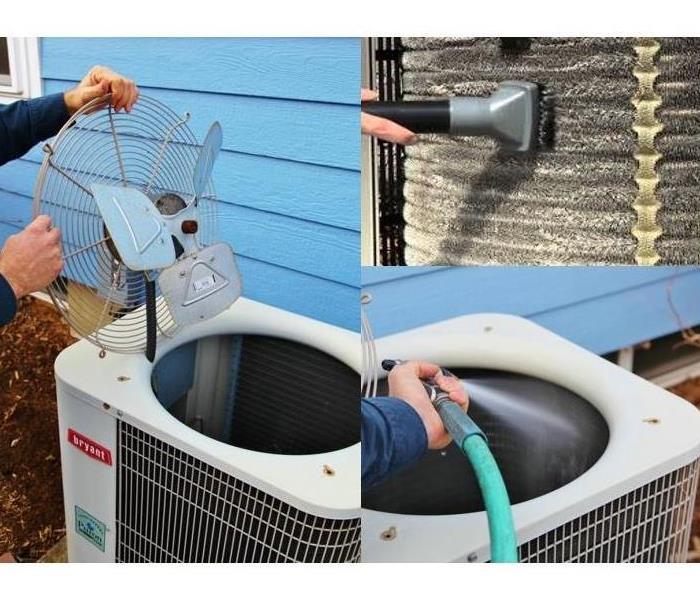SPRING IS IN THE AIR!
4/6/2021 (Permalink)
 This picture shows the AC unit with the fan removed, the vacuuming of the fins, and the water-hose cleaning method.
This picture shows the AC unit with the fan removed, the vacuuming of the fins, and the water-hose cleaning method.
Now that spring has arrived, you should be thinking about getting your HVAC’s external unit (Condenser and Compressor) ready for our hot summer days.
Preventative maintenance for HVAC systems
Regular maintenance can help you save a substantial sum of money. Properly maintained, an HVAC system, interior, and exterior can last over a decade without any need to replace major components.
Just like your interior HVAC system, the HVAC’s external unit (Condenser and Compressor), needs a regular air conditioning service schedule to keep it in top condition. The condenser is one of the most critical parts of the air conditioner system, and you need to keep an eye on it for faults and mishaps. It is suggested to periodically hire a professional to have the AC inspected. A well-trained technician will find and fix problems in your air conditioning system.
PROFESSIONAL PREVENTATIVE MAINTENANCE:
The technician should:
- Check for the correct amount of refrigerant
- Test for refrigerant leaks using a leak detector
- Capture any refrigerant that must be evacuated from the system, instead of illegally releasing it into the atmosphere
- Check for and seal duct leakage in central systems
- Measure airflow through the evaporator coil
- Verify the correct electric control sequence and make sure that the heating system and cooling system cannot operate simultaneously
- Inspect electric terminals, clean and tighten connections, and apply a non-conductive coating if necessary
- Oil motors and check belts for tightness and wear
- Check the accuracy of the thermostat.
DIY PREVENTATIVE MAINTENANCE:
You can do some maintenance of your own. The following are some of them. You can go beyond what is listed by googling DIY AC maintenance. Here you will find many sites that will give you more maintenance suggestions.
Cleaning the external unit (Condenser and Compressor)
Step 1 – Power Off the Unit/Mains
Safety first. You need to make sure that power is not running through the unit when you are going to clean it. You can get this done either by removing the breaker/block or by moving the switch to the off position. If you think that is hard to do, you can also turn off power to the air conditioner condenser at the main electrical panel.
Step 2 – Clear debris and areas around the unit
Keep the area around the condenser free of plant growth. Clean the surrounding area by removing all loose dirt, leaves, and other debris with at least a 2-foot radius around the unit.
The condenser fins are where most of the debris will get stuck, and you need to carefully clean this away. Ideally, you could use a rough paintbrush to remove the debris that is easy to dislodge. After this, you could clean the finer debris with your vacuum cleaner and the brush attachment.
Step 3 – Cleaning the Condenser Fan
This is also an area where a lot of dust and debris can accumulate over time and it needs to be cleaned at regular intervals. There are chances for leaves also to get stuck here. The easiest way to get it cleaned is by wiping it down with a damp cloth and then letting it dry in the sun.
Step 4 – Cleaning Fins Inside Out
Use the brush attachment on a powerful shop vacuum to remove all outside dirt. Then, using a gentle stream from a garden hose, spray through the fins from the inside out to remove any built-up dirt or debris from between them. Never use a pressure washer, since the pressure can damage the fins.
If the fins are particularly dirty, use a commercially available fin cleaning spray available at home improvement centers. Read and follow manufacturer directions.
How far you want to go with DIY maintenance is up to you. It all depends on how handy you are. If the unit is under warranty, verify that any maintenance you do is not going to cancel the warranty.
Now you can have a cool summer! Enjoy!
Source: Hgtv.com, Energy.gov, Acdesigns.net, and A Ryan

 24/7 Emergency Service
24/7 Emergency Service